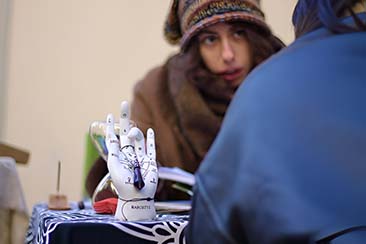Wellness Trends for 2025: A series of posts designed to uncover the most progressive concepts in wellness for the year ahead. Number Four: AI-Based Health Insights.
In the age of technology-driven wellness, Artificial Intelligence (AI) has moved beyond sci-fi to become a potent tool for optimizing health. AI-based health insights represent a breakthrough in personal wellness, offering unprecedented levels of customization and precision. Leveraging data from wearables, smartphone apps, and diagnostic tools, AI enables individuals to gain insights into their health in real-time, revolutionizing preventive care and promoting a proactive approach to wellness.
This guide explores the potential of AI-driven health insights, examining the latest tools, how they work, their impact on personal wellness, and the ethical considerations that come with them.

Understanding AI in Health: How it Works
Artificial Intelligence, at its core, refers to systems that use algorithms to analyze data, recognize patterns, and make decisions with minimal human intervention. AI in health leverages massive datasets—often referred to as “big data”—collected from a variety of sources, including wearables, health apps, and electronic medical records. By analyzing this information, AI can identify trends and correlations, providing insights into individual health metrics and risk factors.
AI-based health insights cover a range of areas, from sleep and activity tracking to dietary analysis and mental health monitoring. AI tools can detect patterns in data that would be impossible to identify manually, enabling the early detection of health risks and supporting better decision-making around lifestyle changes, fitness, and even medical care.

Key Applications of AI-Based Health Insights
AI-based health insights offer a range of applications designed to address multiple aspects of personal wellness. Here are some of the most impactful:
1. Personalized Fitness and Nutrition Recommendations
Many wearable devices, such as Fitbit and Apple Watch, incorporate AI algorithms to provide personalized fitness recommendations based on an individual’s daily activity levels, heart rate, and more. AI can suggest specific workouts, optimize exercise intensity, and even offer tips on recovery times to prevent injury. By analyzing data over time, these devices can adapt recommendations based on the user’s fitness progression.
AI is also revolutionizing nutrition. Platforms like Nutrino and MyFitnessPal use AI to analyze dietary habits, helping users understand how food choices affect energy, mood, and overall health. In some cases, AI can even recommend meals tailored to individual goals, like weight loss or muscle gain, based on daily caloric intake, macronutrient breakdown, and other personal health metrics.
2. Mental Health Monitoring and Support
AI-driven mental health tools are growing in popularity as people seek more accessible ways to monitor and manage their emotional well-being. Apps like Woebot and Wysa use AI-based chatbots to engage users in conversations that mimic therapeutic practices, providing cognitive behavioral therapy (CBT) techniques and mindfulness exercises.
Additionally, wearable technology can monitor indicators related to mental health, such as heart rate variability (HRV), sleep patterns, and physical activity levels. These metrics allow AI algorithms to assess mood trends and flag potential issues like elevated stress or fatigue. While not a substitute for professional mental health care, these tools empower users to monitor their well-being and seek help when needed.
3. Sleep Optimization
AI’s role in sleep tracking goes beyond simple monitoring to provide actionable insights into sleep quality. Devices such as the Oura Ring and SleepScore Max use AI to analyze sleep stages, interruptions, and environmental factors (like room temperature and noise). By tracking these metrics, AI can offer customized advice to help users optimize their sleep environment and routines, resulting in better sleep quality.
For example, if a device detects frequent waking periods, AI algorithms might suggest lifestyle changes like adjusting caffeine intake, modifying bedtime routines, or even incorporating relaxation techniques. Over time, AI-driven sleep insights can lead to significant improvements in sleep quality and, in turn, enhance overall health.
4. Chronic Disease Management
For individuals with chronic conditions like diabetes or cardiovascular disease, AI-based health insights offer a new level of care. Many AI-powered tools monitor blood sugar levels, heart rate, and other vital signs, sending alerts if these metrics deviate from safe ranges. This real-time monitoring enables early intervention, preventing complications and reducing emergency visits.
AI-based insights also provide predictive modeling. For example, apps for diabetics may predict fluctuations in blood sugar levels based on recent meals, activity, and sleep patterns, enabling users to make informed choices. Similarly, heart disease patients may receive alerts about potential risks, helping them manage their condition more effectively.
5. Predictive Health Analytics and Risk Assessment
One of AI’s most groundbreaking applications is predictive health analytics, which uses historical data to assess an individual’s risk of developing specific health issues. Tools like IBM Watson Health analyze genetic data, lifestyle factors, and medical history to estimate an individual’s risk of conditions such as cancer or Alzheimer’s. These insights empower users to take preventive measures, like lifestyle modifications or early screening, reducing their risk and enabling proactive health management.

AI-Based Health Insights and Wearable Technology
Wearable devices are central to the AI-based health insights movement, making health tracking seamless and continuous. These devices—ranging from fitness trackers to smartwatches and specialized health monitors—collect vast amounts of health data, which AI processes to identify trends and recommend adjustments. Here are some leading wearable technologies advancing AI-driven health insights:
Fitness Trackers (e.g., Fitbit, Garmin): Designed to monitor physical activity, these devices track metrics such as steps, calories burned, and exercise intensity, delivering personalized insights to help users meet their fitness goals.
Smartwatches (e.g., Apple Watch, Samsung Galaxy Watch): Smartwatches offer comprehensive health monitoring, including heart rate, sleep tracking, and ECG monitoring, giving users a holistic view of their health.
Specialized Health Monitors (e.g., Oura Ring, Levels for Glucose Monitoring): These wearables focus on specific health metrics, such as sleep quality or blood glucose levels, and provide targeted insights that can aid in managing chronic conditions or optimizing lifestyle choices.
Benefits of AI-Based Health Insights for Wellness
AI-based health insights offer numerous benefits that make them a powerful tool for personal wellness:
Personalization: AI can analyze individual data to create highly personalized recommendations. Whether it’s a fitness plan, a dietary adjustment, or a sleep suggestion, AI tailors its insights to meet unique needs.
Proactivity: By monitoring health data in real-time, AI-based tools empower users to take preventive action. For instance, early signs of stress or fatigue can prompt adjustments before these issues escalate into more serious health problems.
Data-Driven Decisions: AI translates health metrics into actionable insights, enabling users to make data-driven decisions about their wellness routines. This level of feedback is particularly useful for those managing chronic conditions, as it supports a more informed approach to self-care.
Improved Quality of Life: Through personalized insights and proactive recommendations, AI-based health tools enhance the quality of life. Users often report better sleep, improved mood, and higher energy levels, all of which contribute to overall well-being.

Challenges and Ethical Considerations
While AI-based health insights hold significant promise, they are not without challenges and ethical considerations:
Privacy Concerns: AI-based health tools collect and store sensitive data, raising concerns about privacy and security. Ensuring data protection and transparency about how data is used is crucial to maintaining user trust.
Data Accuracy and Reliability: AI systems are only as good as the data they’re fed. Inaccurate data can lead to misguided recommendations, which may potentially harm users. Additionally, health tools are often not regulated in the same way as medical devices, making accuracy a critical concern.
Over-reliance on Technology: There is a risk that users may become overly dependent on AI for health decisions, neglecting traditional healthcare advice. It’s essential to view AI-based insights as supplements to, not replacements for, professional medical guidance.
Accessibility and Cost: Advanced wearable devices and health tracking apps can be expensive, creating a barrier for many people. For AI-based health insights to benefit society as a whole, these tools must become more affordable and accessible.
The Future of AI-Based Health Insights
As AI technology continues to evolve, the future of health insights looks promising. Here are some trends likely to shape the future of AI-based health insights:
Integration with Telemedicine: AI-based health tools may integrate more closely with telemedicine, allowing healthcare providers to access patients’ real-time health data and make informed recommendations remotely.
Enhanced Personalization with Genomics: Combining AI with genomic data could take personalization to new heights, offering insights based on genetic predispositions and lifestyle factors.
AI Health Coaches: As AI chatbots and virtual assistants become more sophisticated, they could serve as health coaches, offering guidance and motivation for lifestyle improvements, making personalized support accessible around the clock.
Advanced Predictive Analytics: With improved data analytics, AI tools may be able to predict health outcomes with even greater accuracy, offering preventive measures for a wider range of conditions.
Empowering Health with AI
AI-based health insights represent a new frontier in personal wellness. By harnessing the power of data, these tools enable individuals to make proactive, informed decisions about their health. However, while AI can offer valuable insights, it’s essential to approach these tools with caution and to use them in tandem with traditional healthcare practices.
As AI-based health insights become more accessible and sophisticated, they promise to empower users with a deeper understanding of their bodies, providing the tools to live healthier, more fulfilled lives. With careful consideration of privacy, ethics, and data accuracy, AI has the potential to make health a truly personalized and accessible journey.








